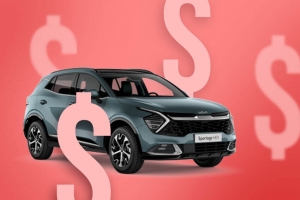
Harley-Davidson Financial Services Launches Product
March 04, 2024Harley-Davidson Financial Services has unveiled “Harley-Davidson Flex Financing.” This loan option provides an alternate way to purchase an H-D motorcycle, that combines the benefits of attractive monthly payments, shorter terms, and greater flexibility, with the ability to return the motorcycle at the end of term, similar to a lease.
Harley-Davidson Flex Financing provides customers with ultimate flexibility by providing multiple end of term options to enhance the H-D motorcycle ownership experience, such as paying off the current bike to own it outright, trade-in, refinance or return it to an authorized dealership at the end of term.
H-D Flex puts customers at the forefront of our products, experiences, and investments. It provides them another innovative financing option to make H-D motorcycle ownership fit their individual budget and lifestyle.
Credit-Scoring Firm Reports Rising Delinquencies
March 04, 2024VantageScore, a national credit-scoring and data analytics company, released its January 2024 CreditGauge, a monthly analysis highlighting the overall health of U.S. consumer credit.
Delinquencies climbed across all VantageScore credit tiers and products in January 2024 (Auto Loan, Credit Card, Mortgage, and Personal Loan). Overall early-stage delinquencies increased 0.9 points from 0.89% in December 2023 to 0.98% in January 2024. This was the second-largest monthly increase in the last four years to the highest level since February 2020. Delinquencies also rose compared to December 2023 in 60-89 DPD (Days Past Due) and 90-119 DPD categories. In addition, overall balances reached a new high in January 2024 at $104,622, an increase of 1.8% year-over-year. Credit utilization dipped slightly (-0.1%) for the month. Borrowers across all credit products demonstrated a higher level of economic stress in January, in part a result of sustained inflation and moderately worsening employment levels.
KBRA Assigns Ratings to Auto ABS
March 03, 2024KBRA has assigned preliminary ratings to eight classes of notes issued by Westlake Automobile Receivables Trust 2024-1 (WLAKE 2024-1), an asset-backed securitization collateralized by a pool of auto loans.
WLAKE 2024-1 will issue eight classes (Class A-2 consists of A-2-A and A-2-B) of notes totaling $1,186.27 million. The preliminary ratings reflect initial credit enhancement of 47.35% for the Class A-1, Class A-2, and Class A-3 notes, through 12.30% for the Class E notes. Credit enhancement will consist of subordination (except for the Class E notes), overcollateralization, a reserve account and excess spread.
This transaction represents the first term ABS securitization in 2024 for Westlake Services. The company has issued 33 subprime auto loan ABS securitizations since May 2010. Most of Westlake’s borrowers have experienced prior credit difficulties and generally have credit bureau scores ranging from 500 to 700. Loans are originated through independent and franchise dealers and segmented into three credit tiers (Standard, Gold and Platinum) each based on a borrower’s credit bureau score. Westlake also utilizes a proprietary model to calculate a customer factor for each loan.
SAAR Sales Pace Estimated at 15.5 Million
February 28, 2024With volume for the month projected at 1.22 million units, February 2024 U.S. auto sales are estimated to translate to an estimated sales pace of 15.5 million units (seasonally adjusted annual rate: SAAR), according to S&P Global Mobility. This would be a step up from the chilly 15.0 million unit pace of January 2024 and reflective of the volatile nature of the current auto demand environment.
“We expect that auto sales in February should recover mildly from the January 2024 result, but sustained momentum seems tough to come by, given the current purchase environment facing auto consumers,” said Chris Hopson, principal analyst at S&P Global Mobility. “While pricing, inventory and incentive trends are seemingly moving in the correct directions, respectively, to promote new vehicle sales growth, high interest rates and uncertain economic conditions continue to push against any consistent upshift for demand levels.
“The S&P Global Mobility U.S. auto outlook for 2024 reflects sustained, but more moderate growth levels for light vehicle sales,” Hopson said. “We expect production levels to continue to develop, especially early in the year as some automakers look to continue to restock in wake of production shutdowns late in 2023 and decent December 2023 sales volume. The advancing production levels sets the stage for incentives and inventory to continue to develop, potentially enticing new vehicle buyers who remain on the sidelines due to higher interest rates. S&P Global Mobility projects calendar-year 2024 light vehicle sales volume of 15.9 million units, a 3% increase from the 2023 tally.”
AMM Calls for Tariffs on Chinese Auto Imports
February 27, 2024China is exploiting Mexico’s trade relationship with the United States to decimate its competition in both the electric vehicle and internal combustion engine vehicle markets, according to a new report released by the Alliance for American Manufacturing (AAM). The report uncovers the existential threat Beijing’s plans pose to the U.S. auto industry should the federal government fail to act now.
Alliance for American Manufacturing President Scott Paul said:
“China is unleashing a torrent of heavily subsidized cars upon the world, and America’s auto industry stands squarely in the path of devastation.

“Fulfilling a plan that’s been in the works for decades to dominate its competition in the global auto market, the Chinese Communist Party has weaponized massive state subsidies and the use of forced labor to enable Chinese companies to sell their goods at cutthroat rates around the world. All with the ultimate intent of annihilating auto manufacturers in America and elsewhere.
“Existing U.S. tariffs and trade action have staved off an extinction-level event for the U.S. auto industry, which is central both to our economic and national security. But China’s predatory trade practices know no bounds. Beijing is already utilizing Mexico as a backdoor for circumventing tariffs for imports to the United States and is following the same game plan that nearly destroyed the U.S. steel and solar industries.
“America’s workers and manufacturers depend on policy leaders to defend them with the trade tools they need to compete on a level playing field and allow our nation’s auto industry and its supply base to flourish. This report offers a roadmap for how to do just that.”
AAM’s report urges the federal government to develop a more complete set of tools to identify, prevent and mitigate China’s trade cheating in the global auto market.
Policy recommendations include:
- Impose exclusionary tariffs on all Chinese automobile imports to the U.S.; enact the Leveling the Playing Field Act 2.0; reinstate Section 421; and improve the Steel Import Monitoring and Analysis System
- Fully enforce and tighten the United States-Mexico-Canada Agreement rules of origin for all automobile content in the 2026 joint review
- Comprehensively implement and enforce the Uyghur Forced Labor Prevention Act with additional emphasis on metals, automotive parts, and battery content and raw materials utilized in EVs
- Strictly enforce the Clean Vehicle Tax Credits authorized under the Inflation Reduction Act and other domestic content preferences for automobile content and related transit











